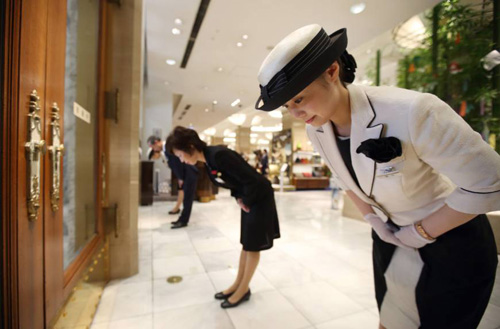
Staff, whether at designer stores or popular Japanese restaurants, are willing to go beyond bowed bows to please customers.
When Christel Takigawa, ambassador of the 2020 Tokyo Olympics, mentioned “omotenashi,” the art of inducing Japanese customers, in a speech before the Olympics Committee to campaign for hosting, she emphasized each syllable with With a proud voice, the listeners were curious about the culture of Japanese hospitality.
In Japanese, “omotenashi” includes “omote” which means the image or appearance of the individual before society and “nashi” means nothing. Combined, “omotenashi” is meant to serve customers from the heart, with sincerity, without faking, without hiding, according to Japan Today.
The art of omotenashi requires meticulous and thoughtful service people. They must anticipate the needs of guests and meet those needs even when customers do not require.
Many foreign tourists come to Japan completely surprised with the service culture of the country of cherry blossom.
“A friend of mine told a funny story that happened at a hotel in Tokyo. When she was struggling to check in, a porter came up to pick up her suitcase. I didn’t understand. what is going on, my friend tried to win back the suitcase. And so, the two sides were struggling back and forth, “wrote Philip Brasor, Japan Today reporter.
A businessman who has worked in Tokyo for many years said he once sent his subordinates to Takashimaya shopping center to buy a cellophane roll to wrap. Because nylon rolls are so bulky, the store doesn’t have any bags to fit, so the staff immediately “fabricated” a paper bag large enough on the spot. Even when going to the stage of attaching the strap, the employee also asked whether the customer wants to hold the bag horizontally or vertically.
Uniqlo clothing store chains have an ambition to expand globally by 2020. However, this is not the reason why this Japanese brand sacrifices quality of service in return for quantity. Uniqlo’s goal is to serve customers around the world with the same quality as serving customers in their own home countries. In order to make this goal a reality, the company organizes training courses for its employees and brings key employees of foreign branches to Japan for training.
“There is Japanese customer service and customer service,” Uniqlo CEO Tadashi Yanai said at the opening of the store in Melbourne, Australia. “We have spent a whole year just training our employees to the standards we want.”
Yoshiharu Kakinuma, the head chef of the three-star sushi restaurant Michelin Sushi Shikon in Hong Kong, likens a meal at a restaurant to a tea ceremony to emphasize the Japanese culture of customer service has been raised. art.
“Sushi is prepared in front of the guests. The bar is open so that customers can see how sushi is made and the chef who created the dish for them. This is one of the ways we show our Respect to guests, “Kakinuma said with no hidden pride.
In addition, omotenashi is also shown through meticulous actions such as the chefs always make sure the temperature of the rice served with raw fish matches the taste of each type of fish, each piece of sushi will come with a sauce. just enough for diners to not bother to think about how much seasoning is enough, and each type of sushi will be brought out in the order calculated in advance.
“At first, when I was working for a restaurant branch in Tokyo, I didn’t understand the nature of ‘omotenashi’. I was 22 at the time,” recalls Kakinuma. “My instructor and the chef did not teach me in detail. But gradually I realized that we should treat every meeting in the world, to us as to each customer, as a one-off event. Once in a lifetime, when I understand that, I serve my customers with all my heart. “
Although “omotenashi” requires the servant to lower the self for the benefit of the customer, that does not mean “humble”. Omotenashi requires mutual respect between guests and waiters.
“It is based on mutual respect. I consider it a privilege to be served by customers, and customers also need to respect us. For example, I don’t want customers to spray perfume when they go to a restaurant meal. because the scent of perfume will ruin their culinary experience and that of others, “said Cookie Chung, a chef with three years of experience at Sushi Shikon in Hong Kong.
Japanese are always proud of the omotenashi culture – “consider customers the best” but not everyone thinks so. In an interview by economic magazine Toyo Keizai in 2015, Mohamed Omer Abdin, a Sudanese researcher working at the University of Tokyo, likened omotenashi culture to “Japanese complacency”.